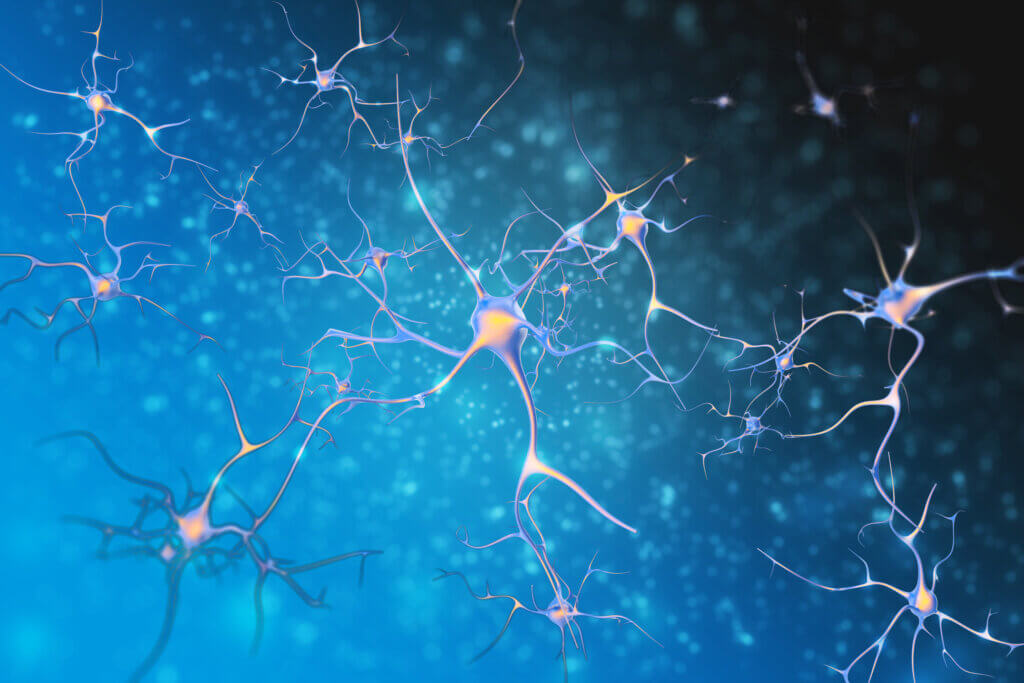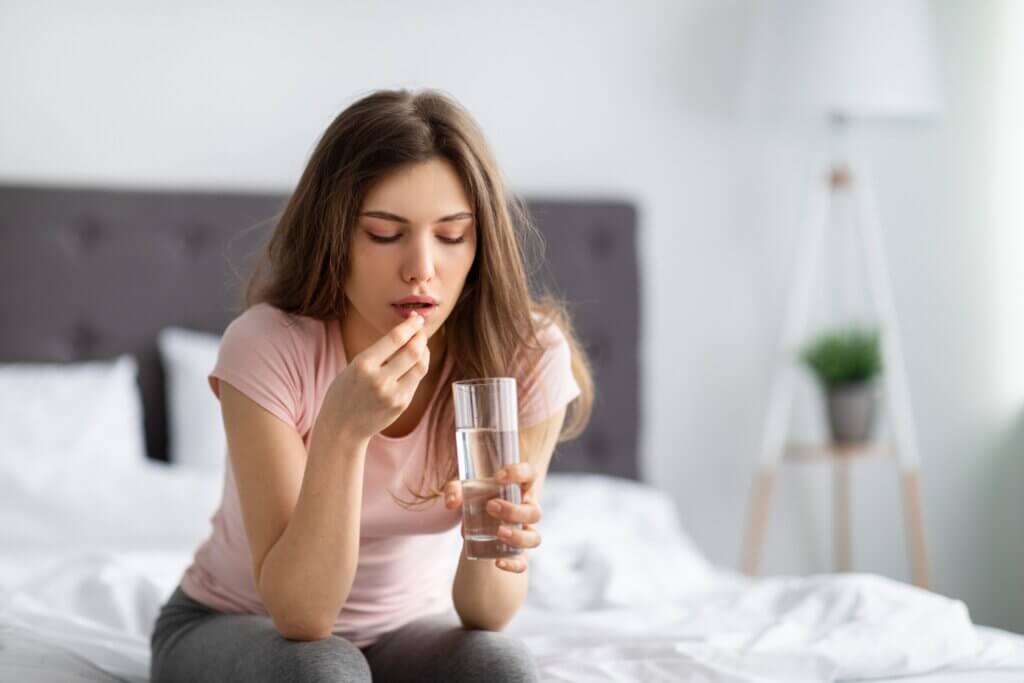The Serotonin Hypothesis of Depression: Is It Still Valid?

Over the past 50 years, one theory has taken center stage to explain depression: the serotonin hypothesis of depression. It’s very likely that you have heard of it, perhaps under a more understandable motto: a chemical imbalance is the cause of depression. But after five decades, how accurate is this statement? And, more importantly, what do the new scientific discoveries say?
Today we know that depression is a very complex phenomenon, one that has many facets, implications, and consequences. Despite the fact that the serotonin hypothesis of depression is supported by thousands of articles, books and documentaries, and also has a place in the media, conferences, and seminars, it’s currently being questioned. Let’s see why.
Serotonin and depression: what is the link and when did it appear?

The serotonin hypothesis as an explanation for depression was proposed in the 1960s. Specifically, following the publication of an article in the British Journal of Psychiatry entitled The Biochemistry of Affective Disorders. In it, Alec Coppen, its author, proposed a revolutionary theory at the time: biochemical imbalances are part of the etiology of affective disorders such as depression.
This statement aroused a wave of criticism among specialists; some discredited the relationship, others supported it. Despite this, the hypothesis didn’t spark a special interest in the media, nor in the general public, or in pharmaceutical companies.
However, little by little, it became the main theory to explain depression; so much so that it displaced all the others, and today millions believe the relationship is reliable.
In principle, and as the experts remind us, the hypothesis was proven correct when studying the depressogenic effects of agents that deplete amines, such as reserpine. It was also due to the action in animals of some antidepressant drugs discovered by chance at the time – specifically, tricyclic antidepressants and monoamine oxidase inhibitors.
Studies related to tryptophan
To corroborate the theory, the researchers forced the depletion of tryptophan. Tryptophan is an essential amino acid that the body uses to make serotonin. We obtain it from the diet, so its intake was restricted to force a temporary decrease. Both then and now, the restriction didn’t lead to clinically significant changes in people who didn’t have the risk of developing depression.
However, when the same process is carried out in a person who has overcome depression, and who isn’t taking medication, a transient and mild symptomatology appears. Studies of this kind, along with others, reinforced the plausibility of the serotonin theory for depression.
Based on this empirical inconsistency, added to current knowledge of neural networks, it is unlikely that only one neurotransmitter is responsible for depression.
Selective serotonin reuptake inhibitor (SSRI) antidepressants
Until the late 1980s, the serotonin-depression hypothesis hadn’t aroused much interest. Despite this, and as experts point out, a group of drugs known as selective serotonin reuptake inhibitors (SSRIs) appeared on the market.
The pharmaceuticals rescued the theory proposed by Alec Coppen, and had the endorsement of the media and prestigious organizations such as the American Psychiatric Association (APA).
The campaign to promote the new drugs was aggressive, resulting in immediate success. According to some surveys, up to 80% of people today think that depression is due to chemical imbalances in the brain. SSRIs are now part of the standard drug treatment for depression, such as sertraline.
Criticism of the serotonin hypothesis of depression

Criticism of the serotonin hypothesis of depression isn’t recent. In 2005 Jeffrey Lacasse and Jonathan Leo published a paper in PLOS Medicine arguing a lack of connection between scientific evidence and the promotion of SSRIs to treat depression.
In it, they further stated that contemporary scientific literature wasn’t conclusive enough to corroborate the serotonin-depression hypothesis. Even the evidence contradicted it, they said.
The issue has come back to the fore following the publication of new articles critical of the theory and the use of SSRIs. For example, in 2020 a group of researchers presented a paper in BMJ Evidence-Based Medicine. In it, they supported, with evidence, the claim that the effects of antidepressants such as SSRIs are barely distinguishable from a placebo.
In a second more recent example, a systematic review of articles related to the association between serotonin and depression was published in the journal Molecular Psychiatry in July 2022. The experts concluded that there’s no evidence to support the theory of serotonin causing depression. Based on this, they also questioned the use of antidepressants that act on this pathway.
Depression is a very complex phenomenon, and scientific evidence and current knowledge don’t support its development through a single neurotransmitter. For example, stressful life events and genetic predisposition are currently counted as the two most important pathways behind their occurrence.
New paradigms
The acceptance of chemical imbalance as an explanation for depression gained wide social acceptance because it helped reduce stigma. That is, it seemed to confirm that it was a real, tangible phenomenon. In practice, far from achieving the latter, the hypothesis has had the opposite effect when it comes to treating the disorder.
An article published in Behavior Research and Therapy in 2014 found that people who believe their depression is due to a chemical imbalance develop a worse prognosis, pessimism, and negative expectations regarding depression. Also, they are prone to shift all the responsibility to pharmacological therapy and to disparage psychotherapy.
The understanding of the mechanisms and processes that lead to a disorder or disease evolves over time. This allows us not only to discover the real cause behind them, but also how to prevent them and how to treat them satisfactorily.
Studies on the causes of depression continue to throw up new hypotheses, and it may be time to discard the serotonin theory as its main catalyst.
Over the past 50 years, one theory has taken center stage to explain depression: the serotonin hypothesis of depression. It’s very likely that you have heard of it, perhaps under a more understandable motto: a chemical imbalance is the cause of depression. But after five decades, how accurate is this statement? And, more importantly, what do the new scientific discoveries say?
Today we know that depression is a very complex phenomenon, one that has many facets, implications, and consequences. Despite the fact that the serotonin hypothesis of depression is supported by thousands of articles, books and documentaries, and also has a place in the media, conferences, and seminars, it’s currently being questioned. Let’s see why.
Serotonin and depression: what is the link and when did it appear?

The serotonin hypothesis as an explanation for depression was proposed in the 1960s. Specifically, following the publication of an article in the British Journal of Psychiatry entitled The Biochemistry of Affective Disorders. In it, Alec Coppen, its author, proposed a revolutionary theory at the time: biochemical imbalances are part of the etiology of affective disorders such as depression.
This statement aroused a wave of criticism among specialists; some discredited the relationship, others supported it. Despite this, the hypothesis didn’t spark a special interest in the media, nor in the general public, or in pharmaceutical companies.
However, little by little, it became the main theory to explain depression; so much so that it displaced all the others, and today millions believe the relationship is reliable.
In principle, and as the experts remind us, the hypothesis was proven correct when studying the depressogenic effects of agents that deplete amines, such as reserpine. It was also due to the action in animals of some antidepressant drugs discovered by chance at the time – specifically, tricyclic antidepressants and monoamine oxidase inhibitors.
Studies related to tryptophan
To corroborate the theory, the researchers forced the depletion of tryptophan. Tryptophan is an essential amino acid that the body uses to make serotonin. We obtain it from the diet, so its intake was restricted to force a temporary decrease. Both then and now, the restriction didn’t lead to clinically significant changes in people who didn’t have the risk of developing depression.
However, when the same process is carried out in a person who has overcome depression, and who isn’t taking medication, a transient and mild symptomatology appears. Studies of this kind, along with others, reinforced the plausibility of the serotonin theory for depression.
Based on this empirical inconsistency, added to current knowledge of neural networks, it is unlikely that only one neurotransmitter is responsible for depression.
Selective serotonin reuptake inhibitor (SSRI) antidepressants
Until the late 1980s, the serotonin-depression hypothesis hadn’t aroused much interest. Despite this, and as experts point out, a group of drugs known as selective serotonin reuptake inhibitors (SSRIs) appeared on the market.
The pharmaceuticals rescued the theory proposed by Alec Coppen, and had the endorsement of the media and prestigious organizations such as the American Psychiatric Association (APA).
The campaign to promote the new drugs was aggressive, resulting in immediate success. According to some surveys, up to 80% of people today think that depression is due to chemical imbalances in the brain. SSRIs are now part of the standard drug treatment for depression, such as sertraline.
Criticism of the serotonin hypothesis of depression

Criticism of the serotonin hypothesis of depression isn’t recent. In 2005 Jeffrey Lacasse and Jonathan Leo published a paper in PLOS Medicine arguing a lack of connection between scientific evidence and the promotion of SSRIs to treat depression.
In it, they further stated that contemporary scientific literature wasn’t conclusive enough to corroborate the serotonin-depression hypothesis. Even the evidence contradicted it, they said.
The issue has come back to the fore following the publication of new articles critical of the theory and the use of SSRIs. For example, in 2020 a group of researchers presented a paper in BMJ Evidence-Based Medicine. In it, they supported, with evidence, the claim that the effects of antidepressants such as SSRIs are barely distinguishable from a placebo.
In a second more recent example, a systematic review of articles related to the association between serotonin and depression was published in the journal Molecular Psychiatry in July 2022. The experts concluded that there’s no evidence to support the theory of serotonin causing depression. Based on this, they also questioned the use of antidepressants that act on this pathway.
Depression is a very complex phenomenon, and scientific evidence and current knowledge don’t support its development through a single neurotransmitter. For example, stressful life events and genetic predisposition are currently counted as the two most important pathways behind their occurrence.
New paradigms
The acceptance of chemical imbalance as an explanation for depression gained wide social acceptance because it helped reduce stigma. That is, it seemed to confirm that it was a real, tangible phenomenon. In practice, far from achieving the latter, the hypothesis has had the opposite effect when it comes to treating the disorder.
An article published in Behavior Research and Therapy in 2014 found that people who believe their depression is due to a chemical imbalance develop a worse prognosis, pessimism, and negative expectations regarding depression. Also, they are prone to shift all the responsibility to pharmacological therapy and to disparage psychotherapy.
The understanding of the mechanisms and processes that lead to a disorder or disease evolves over time. This allows us not only to discover the real cause behind them, but also how to prevent them and how to treat them satisfactorily.
Studies on the causes of depression continue to throw up new hypotheses, and it may be time to discard the serotonin theory as its main catalyst.
- Coppen A. The biochemistry of affective disorders. Br J Psychiatry. 1967 Nov;113(504):1237-64.
- Cowen PJ, Browning M. What has serotonin to do with depression? World Psychiatry. 2015 Jun;14(2):158-60.
- Healy, D. Serotonin and depression. Bmj, 350. 2015.
- Jakobsen, J. C., Gluud, C., & Kirsch, I. Should antidepressants be used for major depressive disorder?. BMJ Evidence-Based Medicine. 2020; 25(4): 130-130.
- Kemp, J. J., Lickel, J. J., & Deacon, B. J. Effects of a chemical imbalance causal explanation on individuals’ perceptions of their depressive symptoms. Behaviour research and therapy. 2014; 56: 47-52.
- Lacasse JR, Leo J. Serotonin and depression: a disconnect between the advertisements and the scientific literature. PLoS Med. 2005 Dec;2(12):e392.
- Moncrieff, J., Cooper, R. E., Stockmann, T., Amendola, S., Hengartner, M. P., & Horowitz, M. A. The serotonin theory of depression: a systematic umbrella review of the evidence. Molecular Psychiatry. 2022; 1-14.
- Pilkington PD, Reavley NJ, Jorm AF. The Australian public’s beliefs about the causes of depression: associated factors and changes over 16 years. J Affect Disord. 2013 Sep 5;150(2):356-62.
- Smith KA, Fairburn CG, Cowen PJ. Relapse of depression after rapid depletion of tryptophan. Lancet. 1997 Mar 29;349(9056):915-9.
Este texto se ofrece únicamente con propósitos informativos y no reemplaza la consulta con un profesional. Ante dudas, consulta a tu especialista.







